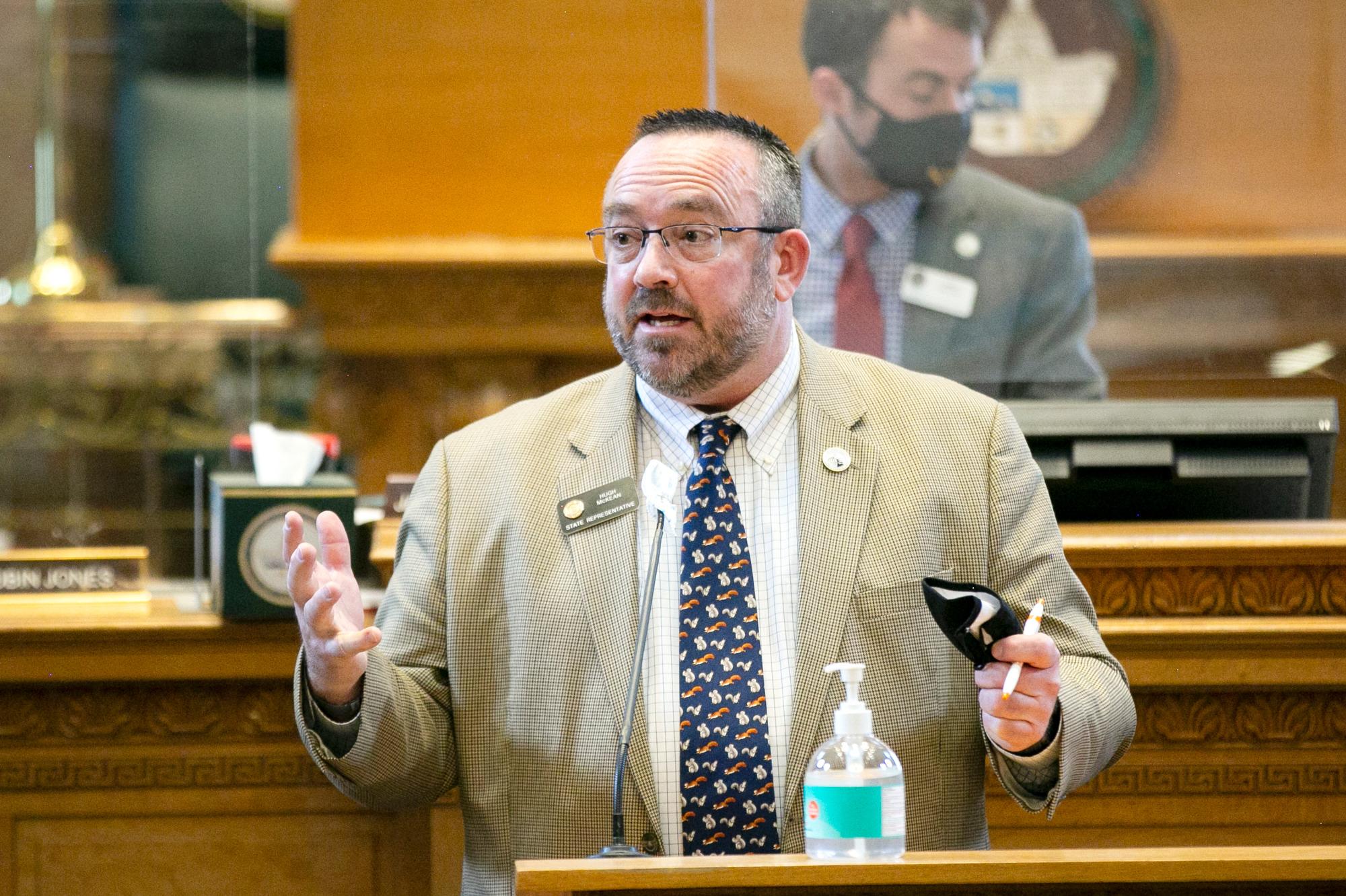
State lawmakers take their votes very seriously — but that doesn't mean they always get them right, and the consequences can be long-lasting.
Take the strange case of House Bill 1298, which recently became the center of a high-profile mis-vote.
The measure is part of a package of gun-related bills Democrats introduced in the wake of the mass shooting in Boulder. It aims to prevent people convicted of violent misdemeanors from purchasing a firearm for five years — and ensure sellers can’t transfer a gun until a background check is complete. House Republicans have been united in their opposition, arguing for hours in hearings and on the House floor that its unintended consequences will hurt law-abiding gun buyers.
So Assistant Minority Leader Tim Geitner said he and the minority leader, Hugh McKean, each did a double-take when they looked at the large electronic boards that tally House votes and realized one Republican had been a yes on the bill.
“We were trying to look at the count like, ‘Well, who did we lose?’” Geitner said. “And it clicked for him like, ‘Oh ...’”
Geitner said that’s the moment they both realized the lone GOP yes vote came from McKean, who had hit the wrong button by accident.
“And I could tell you, his face turned about 50 shades of red. You could see that he was, you know, like, ‘I need to make this right.’”
A request for a do-over was turned down
If allowed to stand, this accidental vote could make it look in the historic record like the gun control bill had bipartisan support — and from the Chamber’s top Republican no less.
So McKean went to the microphone and asked for a do-over.
“Folks, this doesn't happen very often in this chamber, but sometimes it happens on important things,” the Loveland Republican said as he stood before his colleagues to make the rare request.
“I happened to have my computer open a moment ago and I reached up and pressed what I thought was the ‘no’ button, but it was the ‘yes’ button. 1298 was a bill that I was opposed to.”
His request for a redo required support from two-thirds of his colleagues, but not enough Democrats backed him, instead following the recommendation of their leadership to vote no.
“I understand and appreciate your situation, and will take this moment to remind us all that on third readings, we really should have our computers closed and our phones down and paying attention,” said Democratic House Majority Leader Daneya Esgar.
Esgar mentioned that she’s had to remind her own members to avoid distractions during voting too. She told CPR she understands mistakes happen, but that her decision wasn’t about one person, one bill, or even one vote.
“It was about protecting the customs and practices of the House and about being fair to everyone who has cast a vote in this building," Esgar said. "This happens more frequently than a lot of people think, but rarely has reconsideration been agreed to, or even been requested. We have to respect the legislative process, and when a vote is closed, the vote is closed.”
A pro-Second Amendment group has already called for McKean to step down
The political fallout for McKean was swift. The pro-Second Amendment group Rocky Mountain Gun Owners — which already opposed McKean’s leadership role — immediately put messages on social media about his quote “anti-gun” vote and asked him to step down.
“In my opinion, there's two things that drove him to do this,” said the group’s head, Taylor Rhodes in a Facebook video. “Either A, it truly was a mistake and he's incompetent or B, it was truly showing his true colors.”
Jim Pfaff, the former chief of staff for the Republican House Caucus who stepped down when McKean took over the leadership, called him a “gun-grabber” on Facebook, and said he sides with the radical left.
“On a vote this serious, you don't make that mistake. If you make the mistake, you didn't treat the vote seriously. If you meant to vote that way and use that excuse, you're a liar and unworthy of office,” Pfaff wrote.
Not only has the vote caused McKean problems politically and within his fractured caucus, but he also said it hasn’t helped the already tense relationship between Republicans and Democrats in the House.
“I do think that it affects the overall collegiality of the place because when we get down to a discrepancy between the majority and the minority, then often we're in the situation of the majority saying, 'Well, we can do things because we can,’ and that’s tough,” he said.
Former state Rep. Tracy Kraft Tharpe, a Democrat, made a similar mistake last year while she was still serving in the House — she meant to hit the green “yes” button to support a contentious bill about childhood vaccinations, but went for the red “no” instead.
“You know, I still get emails and still get calls from people asking me why I voted no on that vaccine bill,” recalled Kraft Tharpe, who is now a Jefferson County commissioner.
Kraft Tharpe said she didn’t ask Democratic House leaders for a re-do because it wouldn’t have changed the overall outcome — the bill passed and became law — and it wasn’t a politically critical issue for her. But she knows that’s not always the case.
“Hugh McKean will probably hear about this for a long time,” she said of the universal background check bill. “Both from people joshing him, but also more important, from people that are wondering, you know, 'What did you do?’ You didn't vote the way that the party wanted him to and that his constituents wanted him to.”
While most Democrats voted 'no' on a do-over, some are sympathetic
House Democrats are divided on whether McKean should have gotten a do-over. Most voted not to allow it.
“Sometimes it’s really hard to push that button,” said Democratic state Rep. Julie McCluskie of Dillon. “I respect McKean and believe we all deserve grace for our mistakes. But I think allowing him a do-over would have undermined the sanctity of what we do when we press those buttons for a final vote. It’s my greatest responsibility as an elected official and just so sacred to me.”
But for state Rep. Brianna Titone, an Arvada Democrat, McKean’s request was reasonable. She noted it wouldn’t have changed the final outcome, and said people deserve second chances.
“He should've gotten the vote right the first time,” Titone said. “But if I ever run into a problem where I need to do that, I would hope that maybe the same kind of concession might be made for myself. So I'm kind of the, do unto others as you would do unto them, extend the olive branch when you can (type of person).”
The legislature’s two chambers handle these types of situations differently. Do-overs are somewhat routine in the state senate, where the final vote is not electronic. Instead, senators are asked to raise their hands to record a no vote. Those who aren’t in the room at the time end up being automatically counted as a “yes” but are allowed to go back and change that.
McKean could still get a final opportunity to try to correct the record. The bill was amended in a Senate committee. If those changes stay in place when it passes the full Senate, it would have to go back to the House to be re-approved. That would give the minority leader one last chance to — officially — vote no.









